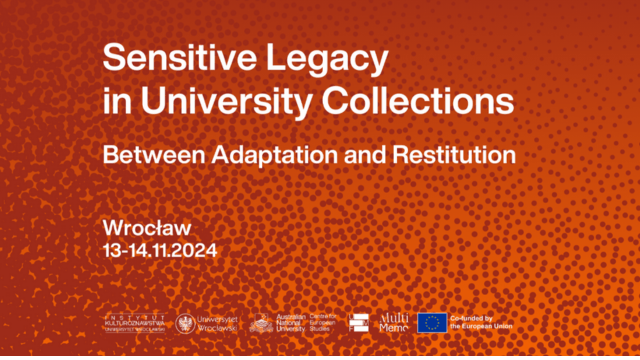
We had a great pleasure to co-host the hybrid conference “Sensitive Legacy in University Collections: Between Adaptation and Restitution”. The aim of the event was to learn about and discuss Australian, German and Polish perspectives on the problematic collection of human remains, ethnographic objects and photographs created in the early 20th century by the German researcher Hermann Klaatsch, which is currently in the collections of the University of Wrocław. This collection is the starting point for our discussion on the status of such collections, their cultural biography and, above all, whether their use in contemporary research is justified.
The conference was recorded and you can watch it here: individual sessions (or here YouTube)
See also additional resources below.
CONFERENCE PROGRAM
Please see the full conference program for details.
Part I: Hermann Klaatsch and his expedition to Australia (7pm - 11pm AEDT)
- Opening remarks by Prof. Renata Tańczuk, Institute of Cultural Studies, University of Wrocław & Dr. Katarzyna Williams Centre for European Studies, The Australian National University
- Dr Hilary Howes, ARC DECRA Fellow, ANU Centre for Heritage and Museum Studies, 'A loss of journey': Reasons for seeking the repatriation of First Nations Australian Ancestral Remains
- Prof. Paul Turnbull, Professor Emeritus, School of Humanities, University of Tasmania, The scientific context and social influence of Hermann Klaatsch’s anthropological research in early twentieth century Australia
- Naomi Appleby and Sarah Yu, Nyamba Buru Yawuru, Broome, We hear their voices now. The story of Yawuru’s journey to repatriate their stolen ancestors
- Dr Katarzyna Williams, ANU Centre for European Studies, Reconciliation processes and truth-telling
- Coffee break
- Dr Corinna Erckenbrecht, Reiss-Engelhorn-Museums, Mannheim, Germany, Hermann Klaatsch and his legacy from Australia
- Dr Łukasz Bukowiecki, Institute of Polish Culture, University of Warsaw, Hermann Klaatsch's legacy in Polish contexts
- Exchange of perspectives - panel discussion with Q&A moderated by Dr. Magdalena Wróblewska (Director of the National Ethnographic Museum in Warsaw)
Part II: Sensitive heritage in museums and academia
- Dr Urszula Bończuk-Dawidziuk, The Museum of the University of Wrocław, The post-German material legacy of the University of Wrocław as a dissonant heritage
- Mgr Agata Stasińska, The National Museum in Wrocław, Worlds enclosed in showcases. Exhibition of non-European art at the University of Wrocław Museum
- Prof. Jan Kotusz, The Museum of Natural History, University of Wrocław, Historical and ethical aspects of maintaining scientific collections at the Museum of Natural History of the University of Wrocław
- Dr Kamila Uzarczyk, Wrocław Medical University, ‘A horn of plenty’: on the troubling heritage of anatomical collections from the time of the Third Reich
- Mgr. Marta Szaszkiewicz, University of Gdańsk - Museum of the University of Gdańsk, Dr. Joanna Ślaga, Jagiellonian University – Museum of the Jagiellonian University, Sensitive collections – challenges and commitments in university museum management plans and practices
- Q&A and conclusions
CONTEXT OF THE CONFERENCE
In 1945, as a result of the Potsdam Conference, Wrocław, formerly a German city of Breslau, became part of Poland. This transnational Polish-German context makes Wrocław, a unique city on the map of Europe, together with other cities and the entire area of the Western Territories that were then incorporated into Poland. The scientific collections of yesterday's University of Breslau, which had been collected and saved from destruction, after the WWII became the property of the Polish state at the disposal of the University of Wrocław. The university's possessions include ethnographic, archaeological and natural history collections as well as human remains collected by German scholars in the colonial period during research expeditions and used by them to pursue studies on, among other things, the origin and evolution of homo sapiens, race typologies, and eugenics.
A telling example of such heritage is the collection of human remains brought to Breslau/Wrocław from Australia by Professor Hermann Klaatsch at the beginning of the 20th century, and used in research conducted by Polish scholars after 1945. Such collections, although not gathered by Polish researchers, have become a sensitive legacy, a difficult heritage of the University of Wrocław illustrating non-obvious historical entanglements between Australia, Germany and Poland. Both their origin and their use raise ethical controversies today, that are set in the postcolonial, postwar and postcommunist contexts.
Hermann Klaatsch's collections of human remains, ethnographic objects and photographs have become a starting point for us to open a discussion on the status of such collections, their cultural biography and, above all, the rights to use them in contemporary research. During the conference, we would like to reflect on the ethical aspects of working on and with such collections.
We want to discuss what are ethically appropriate procedures for using them, as well as whether their restitution, if any, is advisable. We are also interested in hearing the voices of scholars and museum professionals, especially those representing indigenous communities, researchers using such collections for scientific purposes and those who have been involved in the restitution processes.
ORGANISERS
Institute of Cultural Studies, University of Wrocław, the Urban Memory Foundation and Centre for European Studies, The Australian National University. The conference is held as part of the project “MultiMemo - Multidirectional Memory: Remembering for Social Justice”, which UMF is implementing together with eight European partners thanks to funding from the European Union (CERV - Citizens Equality Rights and Values program).
ADDITIONAL RESOURCES
See additional resources compiled after the conference by Dr Hilary Howes.
File attachments
| Attachment | Size |
|---|---|
| Sensitive-Legacy-Conference---Additional-Resources.pdf(115.62 KB) | 115.62 KB |
| Conference_14.11_PROGRAM_final_0.pdf(271.43 KB) | 271.43 KB |